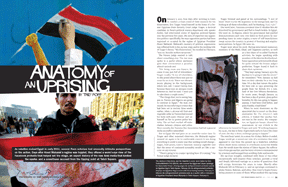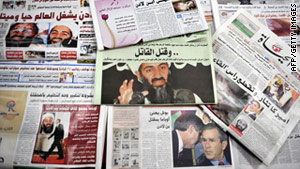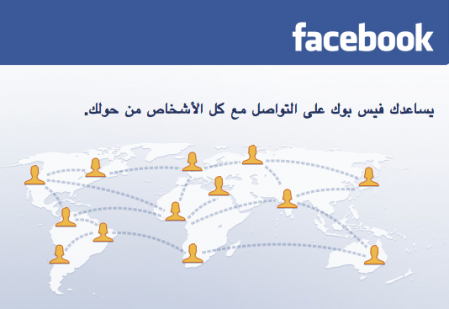 Dr. Marwan Kraidy is an associate professor at the Annenberg School, and he also provided his insight into the world of Arab media for the May|June 2011 Gazette cover story about the Egypt uprising. After the recent killing of Osama bin Laden, we caught up with him again to find out how the news of bin Laden’s death has been resonating across Arab media. Here’s what he had to say.
Dr. Marwan Kraidy is an associate professor at the Annenberg School, and he also provided his insight into the world of Arab media for the May|June 2011 Gazette cover story about the Egypt uprising. After the recent killing of Osama bin Laden, we caught up with him again to find out how the news of bin Laden’s death has been resonating across Arab media. Here’s what he had to say.
Gazette: In the Gazette story on Egypt, you talked about the proliferation of Arab news channels over the last 15 years, and the astounding variety of media outlets that now exist. How is the killing of Osama bin Laden being reported in the Arab world?
Kraidy: I have been following it—although not all the media, because we’re talking about, by now, 600-plus satellite television channels. So there’s a very wide gamut of opinions. I would say overall there’s a sense of…maybe not the overwhelming joy and celebration we saw in the U.S., that the U.S. media seems to have been reflecting. But there’s a sense of, on one hand, people who are very happy this happened, which seems to be a good segment of the [Arab] media and the population. There’s a very small group that is very angry and sad that this happened, but that’s really a very, very small minority, that I think in some cases the Western media has blown out of proportion.
Then there’s a variety of positions in the middle ground, where they say, “Yeah, that seems to have happened, but the details are murky.” Some others say, “The Americans are lying to us; we have no proof this has actually happened. Let’s see the proof.”
Do you sense any consensus in Arab media as to whether or not bin Laden is in fact dead?
 Let me give you one example. There are three large, pan-Arab newspapers—these are three papers that are published for the most part in London, that address readers across the Arab world, and they’re read very widely. The editor-in-chief of one of these newspapers, which tends to be critical of U.S. foreign policy, ran an editorial yesterday titled, “They are Lying to Us and They Want Us to Believe Them.” This is one example. Other editorials are saying, basically, good riddance. So this is the gamut that’s reflected.
Let me give you one example. There are three large, pan-Arab newspapers—these are three papers that are published for the most part in London, that address readers across the Arab world, and they’re read very widely. The editor-in-chief of one of these newspapers, which tends to be critical of U.S. foreign policy, ran an editorial yesterday titled, “They are Lying to Us and They Want Us to Believe Them.” This is one example. Other editorials are saying, basically, good riddance. So this is the gamut that’s reflected.
I do think it was a mistake, from the perspective of Arab public opinion, for the Obama administration not to release the picture.
In The Atlantic the other day, Eric Trager talked about how The Muslim Brotherhood in Egypt has been using the honorific “sheikh” before bin Laden’s name. Have you seen coverage of bin Laden’s death that treats him as a martyr?
Nothing that treats him as a martyr that explicitly. But for instance if you look at Facebook pages in Arabic there are big debates going on. One of them is precisely this one: is he a martyr, or not? Parallel to that is, is he a terrorist or a freedom fighter?
For instance, there’s one page that says, “The terrorist bin Laden went to hell.” That’s one page, and that’s in Arabic. There’s another that says, “Congratulations for the killing of the terrorist bin Laden.” There’s another page that says, “Bin Laden as a terrorist represents himself,” basically to say he doesn’t represent all Muslims.
There’s another Facebook page that says, “We all support the martyr, the hero bin Laden.” There are some pages that say, “Let’s pray for his soul.” So there are some Facebook pages that seem to be supportive…[but] those that are critical of bin Laden seem to be more in quantity, and more intense in their language.
Recently, the debate has focused on this question of whether or not the photo of bin Laden’s corpse should be released. What’s your position on that question? And if the photo was released, how do you see it playing across the Arab media sphere?
My view, from the point of view of Arab public opinion, is that it should be released. There will always be a very small hard-line group that will not believe anything…but it really depends on the picture. All we know about the picture is that it looks very graphic, according to the White House.
One of the things that Wikileaks showed is that people are really hostile and fed up with government secrecy, worldwide. Given that backdrop, I think releasing the photo is better than not releasing it. I know it’s a difficult decision…but I think when all the issues are weighed and all the repercussions are considered, it’s better to release it than not.
But the flip side is, in an age when anything can be Photoshopped, does the picture still carry any evidentiary force?
I think it would, if it’s on the website of the White House. Then the burden of proof to say, “This is a fake picture,” goes up big time. It really depends on how it’s framed.
Why not be part of the effort to show what really happened? Because we’ve heard so many details and so many contradictions that it’s beginning to look ridiculous. Was he armed, or wasn’t he armed? Was there a woman between him and the Navy SEAL, or was there not? How many people got killed? What time did it happen? What do you mean by observing Islamic burial ritual? Was he just dumped from a helicopter into the sea? Whatever it is. There are so many details that remain unanswered, that I think it would be good to release the photo.
And it sounds like the effect of the photo would be different if it were leaked, rather than released with the imprimatur of the White House.
Yes, if it eventually leaks it will lose its power. It will become just one of the pictures floating around the Internet. If its released on the website of the White House, I think that sends a statement that the White House stands behind it.



